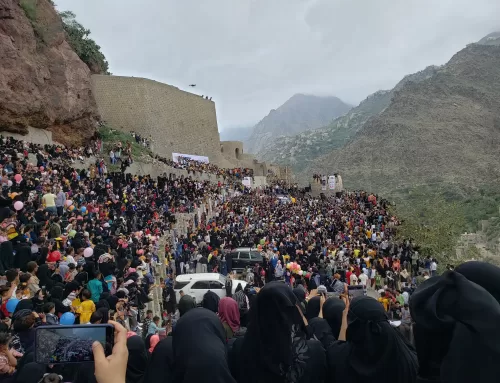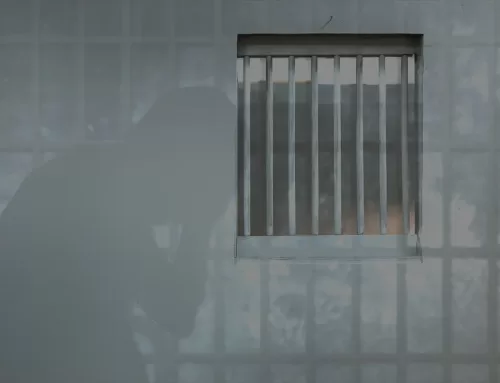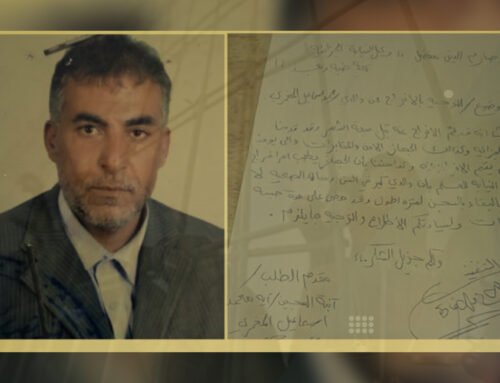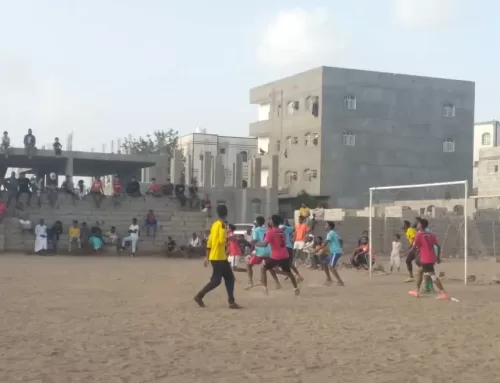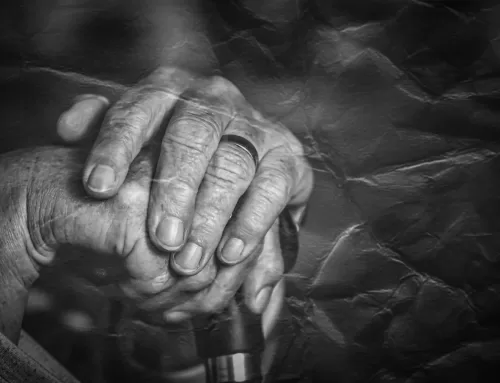Huda Jafar
The original text was published in Arabic on Manshoor
The sound of bullets is not a cacophony in the Sana’a symphony. We are used to hearing it at any time, especially at night, since Yemenis had the ritual of firing celebratory shots, in addition to the 2011 clashes that are still fresh in our memories, when dogs devoured the bodies of the dead in the Al-Hasba neighborhood because they couldn’t find somebody to bury them in their last sleep. The impact of bullets can still be seen on some buildings in Hayel Street, resembling the scars of smallpox on a handsome face.
However, the events that started to unfold in Yemen since late 2014 are unlike anything we’ve ever seen before.
September 2014 – March 25th, 2015
With the support of Ali Abdullah Saleh’s forces, the Houthis succeeded in seizing control over Sana’a on September 21st, 2014, and we began to see their motto slowly growing and expanding like poison ivy, appearing on buildings, public signs, traffic lights and the round barrels (small barrels centered on street intersections in most Yemeni cities). In their green, white and red motto, they assert that “Allah is Great (Allahu Akbar), Death to America, Death to Israel, Curse the Jews and victory for Islam.”
Although we, who protested against the rule of the late President Ali Abdullah Saleh in 2011, were used to the slogan in the streets of the protests back then, seeing it floating over a ragged Houthi tent is quite different then when it is stuck on the walls of the Ministry of the Interior, Bab al-Yaman (the Gate of Yemen) or the wall of Sana’a University.
The year 2014 ended and paved the way to an inflamed and heavy new year. A sequence of grave events took place and if I had seen them in a movie, I would have accused the director of having a poor plot with multiple holes: President Abdrabbuh Mansur Hadi submitted his resignation, then he was placed under house arrest by the Houthis, and in a plot twist, the President escaped from his residence in Sana’a to appear in Aden, from which he fled back to Saudi Arabia.
Before that, one by one, diplomatic missions left Sana’a, but we said that this move was due to “foreign overindulgence” and that they will return in a month or so. Yemenis have been accustomed to fighting for such a long time, that we no longer remember when it started. Usually, it lasts only for days or months, before a friendly country intervenes with a rogue state and voilà: we have a peace agreement that lasts for several years that are sufficient for us to go back to the happy lives that we were trying to lead despite the many crises.
It is true that the civil war that broke out after the September Revolution of 1962 lasted seven years, but the circumstances of the fighting no longer prevail in Yemen today. Hope stirred within us, even as we smelled the peaceful Sana’a breezes that carried the smell of gunpowder after the Marines burned their weapons, and even after information was leaked to us that some of the embassies had completely destroyed their technical equipment (instead of getting rid of them), in a clear sign that they will not return.
The Houthis invaded Aden and engaged in clashes with supporters of President Hadi, the National Army, and the so-called “Resistance”. We communicated with our relatives and friends there without receiving any response, but rather mournful cries, incomprehensible grunts, requests for forgiveness and pardon. We heard the following sentence uttered repeatedly: “no one ever knows when their time is up.”
A Movie that Wasn’t Watched and a Meeting that Wasn’t Held
At about 2:20 am on Thursday, March 26th, 2015, I was in my room thinking about my meeting with a Norwegian organization a few hours later. My sister was in her room, which is next to mine, and was getting ready to watch a movie. Then, we heard that loud sound that awoke all of Sana’a without exaggeration.
Within seconds, people started asking through messages and on social media about the source of the horrific explosion that resembled in my imagination the cry of an ogre. We received conflicting news, and because we had a shortage of electricity, we could not watch television. Finally, we heard unexpected information from Al-Hadath news channel: The Saudi-led Operation Asifat Al-Hazm “Decisive Storm” launched its first military operation against the Houthis in Yemen.
Due to the strength and extremely loud sound of the two or three strikes, we thought they hit the neighbors’ house, but they fell tens of kilometers away from us.
We could not sleep, and we could not wake up either. Then, I received an email in my work inbox from the director of the American organization, telling us that we are on leave until further notice, and that there is a United Nations plane that will take our foreign colleagues to the nearest office in an African country temporarily.
The First Day of the Pit
That Sana’a morning was colder than usual and I spent it watching the news in silence, as if I didn’t have a voice. Yesterday, the day before the bombing, seemed remote and far away like a Mangrove on the coast of a Philippine island.
I went down to buy some groceries for lunch. I was determined to go about my day normally even if it had started with the disaster. We ate food that tasted like dust, and we sat waiting. In the afternoon, we received pictures of the victims of the first bombing of Sana’a, which was in the area of Bani Hawat east of the airport.
The number of victims was 67 people. I looked at the pictures with eyes that did not comprehend what they were seeing: children, men and women, torn to pieces that were scattered on pillows, rugs and walls that fell on them as they slept and kept them in the same position, but one body drew my attention.
The torso of a twenty-year-old woman was showing while the second half of her body was buried under the rubble. She was wearing purple clothes and had a soft Yemeni face, pure white skin (a characteristic of the women of Sana’a) and a straight nose. Her so white neck was positioned in a weird angle that I had only seen in horror films that tell the stories of women possessed by demons breaking their necks. Yes, I thought that the thing that can break a woman’s neck in this manner must be a devil.
It was my first night in the pit, a dark pit that is still hot because it had just been dug, a pit that dragged me into its hollow insides during the first day of bombing.
The next explosions occurred at around 6:00 pm. We rushed to the ground floor, in compliance with the safety procedures that we received through Whatsapp. On that floor, lived a Syrian family consisting of a mother and her four daughters, who used to live happily in a beautiful neighborhood in Damascus, but like millions of Syrians, escaped the hell of war that followed them to Sana’a.
We used to spend most of the day with them, speechless, wrapped in thick blankets that smelled of cleanliness, with black tea cups being offered with glass dishes carrying different types of locally made biscuits. Between the bombings, the girls would tell us horrible stories about the death plaguing Syria.
They talked about their neighbor who was dragged out of his house in the middle of the night and described how they could not open the door of the apartment to find out what was happening despite hearing his screams that filled the building. They spoke about masked men who threw something heavy in the neighborhood’s big garbage container, only to discover in the morning the body of a man with two bloody holes in his face, in the place of his eyes. The girls were more courageous than we were, and they were not too scared (surprisingly) by the terrifying sounds of shelling.
One of our relatives suggested that we move to her village, since it is safer than the fate of Sana’a. Whenever our Syrian neighbor heard us talking about moving to the village, she would say to us: “You will take us with you wherever you go and you won’t leave us, right?” We would respond with yes. We couldn’t let them experience alienation twice. So we said, but we left them unfortunately and did not keep our promise. Nothing is more fragile than the promises made in wartime.
After two days, we began to sharpen our senses. I mean, we could hear the sound of the plane from a distance, as it was making its way toward us like an enormous and voracious anaconda. The duration does not exceed 15 seconds, which is enough time to hide. We were seven women and three children in an apartment down the stairs, in the heart of an eternal city torn apart by dozens of repulsive hands, and in our minds, moved dark thoughts about what lonely women are exposed to in the wars of men/monsters.
If someone had asked me before this experience about the feeling that would take hold of me if I lived under aerial bombardment, I would have replied that it was fear. During these days however, fear was not the “monster”, but rather humiliation, which is the headline under which all other feelings fall. We would run quickly towards the neighbors’ house as we tried to grab with our hands documents, food and pillows. We would cry tears that refused to fall down our faces. We would cling to each other’s bodies, and pray to God to save us from a death that we did not deserve.
Time, even without the sounds of flying and shelling missiles, was heavier than Mount Eban. I could feel every second passing on my skin like small scorpions, even though the sense of time did not change, whether it was at dawn, dusk or after midnight. The feeling was similar to the state you are in after waking up from an afternoon nap; grumpy, with a terrible headache and a dry throat.
We were planted in front of the television screen, expecting to hear news about the shelling stopping at any time. I still remember that political analyst, an Egyptian citizen, who said he expected the war to end after only two weeks or a month at the most, and I remember that we didn’t like what he had to say. How can we endure this situation and anxiety for a whole month? We did not know it would be a long, open and heavy war.
It is strange that the news bulletins didn’t show the bodies of the victims, who we know too well died under the bombardment of the “Decisive Storm” alliance. I switched between channels, but the result was the same: the news was completely devoid of the bodies of the bombing of Sana’a, Saada, ‘Amran and other cities. Even the victims of the Houthi killing machine were barely shown in news reports. I knew at the time that the Yemeni corpse lacked something in order to be considered suitable for the main headlines to “compete” with the bodies of the East and West.
At night, I had only one task: stare at the ceiling of the room, which turned into a screen projecting pictures of burning buildings, the news about the launching of the “Decisive Storm” operation as announced by Al-Hadath channel and the icy-necked corpse, and a question that repeated itself over and over again: When will this ceiling fall on me?
During the day, I try to pull myself together. You have to do it for the people around you, pretending to be strong, resistant. You have to pretend that your pale face isn’t due to speculations featured in the news, analysts’ publications, and the tweets of powerful decision-makers, and that your eyes aren’t puffed because you cried all night. Most of the ten countries that participated in the “Decisive Storm” are saddled with enduring dictatorships. They didn’t show mercy toward their own people, so what will they do to us then?
On March 28th, the writer Iskandar Habash contacted me to write an article about the position of the Yemeni intellectuals concerning the “Decisive Storm” operation, which would be published in the Lebanese newspaper Assafir. I agreed and contacted a number of writers, poets and novelists, with whom I had very good relations. I was able to accomplish the work in almost 5 days, while I buried myself under a huge amount of clothes and listened to the English singer Black saying “It’s a Wonderful, Wonderful Life” I played it repeatedly until I actually ended up believing it.
Writing that piece was a good idea because it distracted me from focusing on the walls of the pit. I imagined myself saying in 20 years (if I survive this war), that I wrote that article under the bombardment of our “Brothers” using American, British, and French-made aircraft, and that I was in a country where the Houthi gang chewed off every day a piece that was bigger and more precious than that of the day before.
On the same day, I received another email from the director of the organization informing us that we had to resume work (I did not know what was the point of undertaking administrative tasks in a country full of horrors). We were also asked to send a Whatsapp message to the acting director at 8 am every day to inform him that we were fine.
On a normal day, it would take me 20 minutes to reach my work place. On that day, I found myself in front of the organization’s red-colored gate (Deer Blood in the Yemeni dialect) after seven minutes. I smiled bitterly as I remembered Khalid Zaki in the film «Tabbakh El Rayess» (The Cook of the President) inquiring from the minister: “Where did you send the people to, your Excellency?”
Where did the “people” go, Sana’a? The streets were as empty as a baby’s mouth. You might have seen one, two or three people pass by in a hurry as if they were avoiding a rainstorm. I avoided looking at the places I used to go to on Hadda Street: Khan El Khalili Restaurant, Kebab Al Mansour, KanYa Ma Kan Movie shop, Al Bayt Al Saaid Furniture, Baskin-Robbins in the corner where I had too many memories, the corner that leads to the home of my dear friend.
I also avoided looking at the road stretching in front of me, on which I used to take countless of trips, with a thousand melodies blasting from my music player.
The working hours passed by as we discussed the fate of our colleagues in Aden. We haven’t heard anything from six people since the occupation of the Houthis. We only received snippets of information that were more harmful than useful: the last time this man was seen, he was buying bread from the bakery, and the last time this woman was seen, she was crossing the street with her elderly mother. As for this other woman, she escaped from her white villa after a terrifying tank settled in front of her gate.
No one could leave their house to check on others because Houthi shells were always ready. The people of Aden ate onions, biscuits, garlic and stale bread for days because they couldn’t get out. When the network allowed us to contact our families in Aden, Al Hudaydah or Taiz, the phones were either closed or those who answered could barely utter a comprehensible answer.
The shelling occurred several times on a daily basis. It sounded a bit like the sound of thunder, but it was more intense, deep and powerful. It sounded as if a thousand thunders were happening at one time.
The only things worse than the horror of air strikes were the doors of closed shops in the neighborhood after they used to be full of customers, goods and laughter, and the scene of neighbors from nearby buildings carrying their few belongings over their “Begoot” (Peugeot) cars, as the Yemenis call them, and going towards the unknown to escape the death that was coming towards us, slowly but surely. Events such as those would burn me out completely.
This war pushed us to learn the names of mountains, alleys, streets and popular markets, in order to be able to check up on our friends and our favorite places. After every bombardment, we would breathe deeply, and then we were stripped of all hope with every new bombardment, that occurred hours, and sometimes even minutes, after the previous one.
Obstinacy and pride were useless. We should behave like “Sons of War” from now on, which means that we should be light on our feet and arrange the most important papers and items in a sturdy, easy-to-carry bag, in case we were forced to leave Sana’a.
Leave Sana’a? That idea was so brutal and tough. It would be more pleasant to die because of a missile than to leave Sana’a. That death seemed more reasonable than leaving my job, my room, my friends and my places.
However, as the shelling intensified, and the number of horrendous bodies increased and were closer to our house, my parents’ calls from a neighboring country increased, urging us to leave Sana’a, even if it was on a helium balloon.
The Dawn of April 5th
My sister received a phone call, informing her that a plane belonging to the embassy she works for was leaving at 7 am with the remaining nationals of that country, and that there were only two places left on board. So, we weren’t able to take our Syrian neighbor and her four daughters. All of the ports in Yemen had been closed by order of the Coalition, and were to open only with its permission. So, that was the only opportunity we had.
The decision was taken and I found myself doing the nightmare task. I felt that as if I had left my body and was looking at myself with complete neutrality, while I was silently gathering my clothes and things in a bag that I no longer remember. I held in my tears and my movements were brief and direct. Whoever has seen the Hungarian movie “Son of Saul” might understand what I’m talking about.
A few hours later, I was at Sana’a airport, and after a few longer hours, I was at a strange and cold airport. I watched people living in their own world and I thought to myself: God has decided to forgo all these sinners and punish me!
But there was a weak voice whispering to me that we were inevitably returning, after a month or two, or maybe after Ramadan. The friendly states cannot allow the death of Yemenis to happen openly during the days and nights of Ramadan. Time would inevitably pass and I would return to my Sana’a, so I should consider this outing as a picnic, vacation or a trip.
We boarded the plane and saw Sana’a getting smaller under below us, and I felt it being snatched from every cell in my body. Three days after our departure, we received the news of the death of my beautiful cousin, who was full of life and kindness, after being hit with a Houthi bullet less than two months after his twentieth birthday.
I spent 10 days under the bombardment and it felt like every day an arm would extend into the ground, dig a gigantic pit and drag me into its darkness, regardless of where I was. I discovered that war gets to you anywhere and you can never be truly saved from it.
I survived with my body and my physical safety, but the pit grew darker. I was able to follow the news of Sana’a from my safe place on a brown sofa in a very humid coastal city. I saw a video clip of Sheikh A’aed al-Qarni saying that he was very proud because his relative Marwan al-Qarni was spouting “It is not I who is launching, but rather it is God” before launching a missile on Mount Attan. This reliance on God burned the mountain for a day and a half.
I replayed this clip hundreds of times, and each time, I saw the pictures of the dead who were killed by the explosion of Mount Attan, the body parts that couldn’t be identified, and the picture of Lina Shujauddin, the sweet lady I met on one occasion, a year before she, her husband and son died in the Al-Qarni’s «blessed» missile.
I saw the pictures of the houses after the bombing of Mount Nukum, and I heard the story of that beggar who was roaming around a neighborhood nearby, and who was reduced to a mere kidney hanging on a dry branch. I saw the pictures of “Kolyyat Al-Shurtah St.’ Police Academy Street, whose name didn’t fit its reality. It used to be full of beauty salons and shops for wedding dresses. I contemplated the shop from which I had bought my wedding dress nine years ago. Its facade had been distorted and all the white dresses there had been burnt.
I saw the windows of my office that were broken and scattered like their counterparts in the “Crystal Night” a long time ago.
I saw the child Farid in Taiz, where the Houthi shells altered his youth. He appealed to the nursing staff at the hospital: “Do not bury me”. But his sad cry was inconsequential for those fighting to get a piece of the Yemeni cake, ranging from “the Shiite Lions” to “the Sunni Tigers” and the other “Brutes of the Sects”.
I saw pictures of those who died of starvation, those who died of grief, and those who died waiting for their departure in an airplane to carry them to a country that might accept to treat them. I saw yesterday’s proud people covering themselves at night so that no one saw them as they ate from the garbage. I saw the Houthi gang expanding like an oil spill in a fine sea, poisoning all possible ways of life.
Time passed, and the war aggravated, while Sana’a became distant and no longer felt mine. I stopped counting the hours, days and months a thousand days after I was yanked from Sana’a, and I remained confined in that pit, the ten-armed pit.


